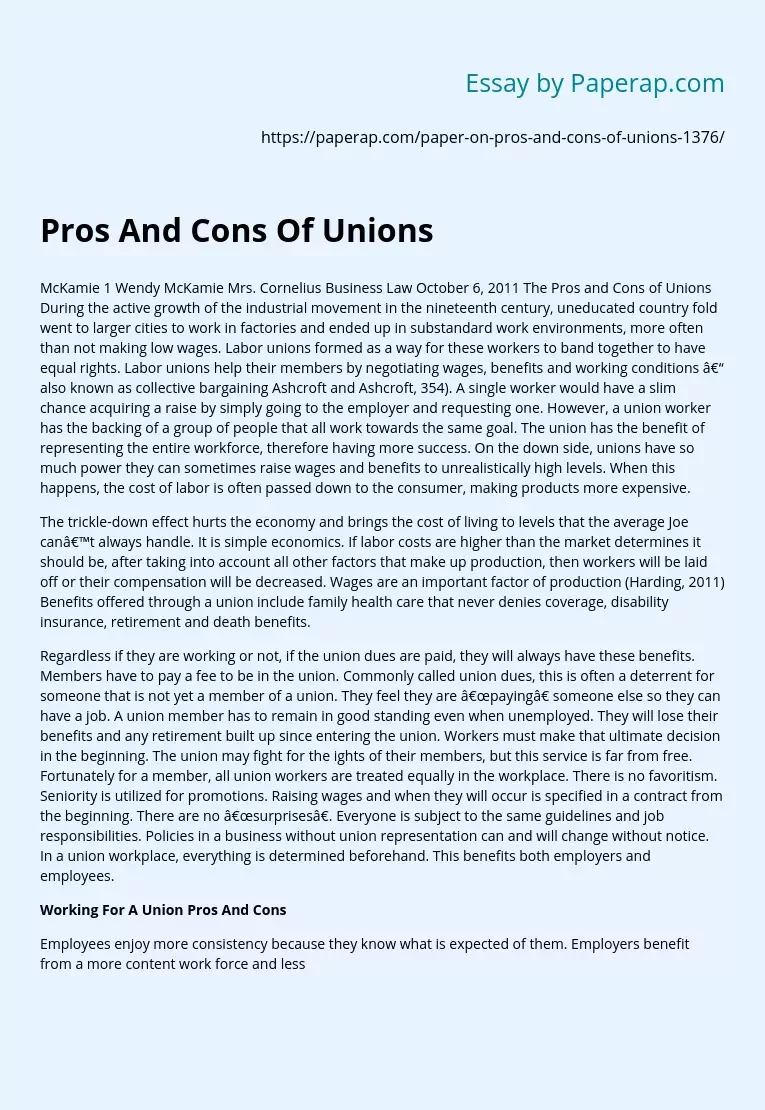Pros And Cons Of Unions
McKamie 1 Wendy McKamie Mrs. Cornelius Business Law October 6, 2011 The Pros and Cons of Unions During the active growth of the industrial movement in the nineteenth century, uneducated country fold went to larger cities to work in factories and ended up in substandard work environments, more often than not making low wages. Labor unions formed as a way for these workers to band together to have equal rights. Labor unions help their members by negotiating wages, benefits and working conditions – also known as collective bargaining Ashcroft and Ashcroft, 354).
A single worker would have a slim chance acquiring a raise by simply going to the employer and requesting one. However, a union worker has the backing of a group of people that all work towards the same goal. The union has the benefit of representing the entire workforce, therefore having more success. On the down side, unions have so much power they can sometimes raise wages and benefits to unrealistically high levels. When this happens, the cost of labor is often passed down to the consumer, making products more expensive.
The trickle-down effect hurts the economy and brings the cost of living to levels that the average Joe can’t always handle. It is simple economics. If labor costs are higher than the market determines it should be, after taking into account all other factors that make up production, then workers will be laid off or their compensation will be decreased. Wages are an important factor of production (Harding, 2011) Benefits offered through a union include family health care that never denies coverage, disability insurance, retirement and death benefits.
Regardless if they are working or not, if the union dues are paid, they will always have these benefits. Members have to pay a fee to be in the union. Commonly called union dues, this is often a deterrent for someone that is not yet a member of a union. They feel they are “paying” someone else so they can have a job. A union member has to remain in good standing even when unemployed. They will lose their benefits and any retirement built up since entering the union. Workers must make that ultimate decision in the beginning. The union may fight for the ights of their members, but this service is far from free. Fortunately for a member, all union workers are treated equally in the workplace. There is no favoritism. Seniority is utilized for promotions. Raising wages and when they will occur is specified in a contract from the beginning. There are no “surprises”. Everyone is subject to the same guidelines and job responsibilities. Policies in a business without union representation can and will change without notice. In a union workplace, everything is determined beforehand. This benefits both employers and employees.
Working For A Union Pros And Cons
Employees enjoy more consistency because they know what is expected of them. Employers benefit from a more content work force and less time spent on training to enforce constant changes. Strikes are a powerful tool for unions. If demands or negotiations aren’t met by an employer, every member is expected to quit work immediately. These can cause serious repercussions to people even if they aren’t involved in the debate. For example, if teachers go on strike in order to negotiate higher wages, school has to be canceled and students are put out of class.
Nurses can seriously hurt how a hospital is run. Without nurses, there would be nobody licensed to take care of the patients other than doctors, therefore putting the patient’s health at risk. Strikes are rare but the potential still must be considered when discussing the benefits or problems with unionized labor. Current union workers will tell you being a member of a union today isn’t the same as it was in the 1970’s or 1980’s. The advantages now are far less than it was then. The decline in employers that hire union workers has made it difficult to find work.
Some only work half of the year in their particular trade because so many employers would rather save the bottom dollar than hire a skilled professional through a union (Jaggers, 2011). The bad reputation of unions precedes them therefore slowing down recruitment of future union members. To an extent, this is due to lack of information to the general public about the benefits that a union provides to employers and employees. Unions exist to make life better for employees, but they also provide benefits to employers.
Had it not been for unions, there would not be your typical 40 hour work week, an established minimum wage, or even overtime wages. Unions may seem outdated now, but they did serve their purpose when they were formed and for many years thereafter. Works Cited Ashcroft, John D. and Janet E. Ashcroft. Law for Business, Seventeenth Edition. South-Western, Cengage Learning, 2011. Harding, Jeff. “Why Unions Are Bad for the Economy. ” 22 July 2011 The Daily Capitalist. Jaggers, James (current member of Local Sprinkler Fitters Union 669). Interview with Wendy McKamie 26 September 2011.
Pros And Cons Of Unions. (2019, Dec 05). Retrieved from https://paperap.com/paper-on-pros-and-cons-of-unions-1376/

